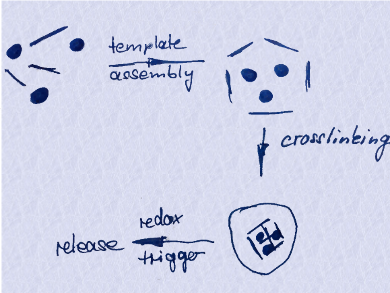Intracellular protein delivery has gained interest in basic cell biology and biological therapeutics. A robust and sustainable delivery strategy requires good protection of the cargo as well as reversibility in conjugation and activity.
Jiaming Zhuang, S. Thayumanavan, and colleagues, University of Massachusetts, Amherst, MA, USA, have developed a simple and effective strategy for the encapsulation of proteins and their traceless release in the cytosol in response to a specific trigger. In a protein-templated polymer self-assembly a capsule is formed around the proteins. In a first step, the organization of polymers around the protein is templated by lysine handles which are abundantly available on the surface of >85 % of the globular proteins. This leads, in a second step, to the formation of a polymer capsule by polymer side-chain cross-linking.
The target protein is encapsulated with high fidelity. The polymer capsule is removed tracelessly with high efficiency in response to a target intracellular environment and the native structure and function of the protein are retained upon release.
According to the researchers, this simple and general strategy will serve to produce a potent protein therapeutic delivery platform for a broad range of proteins.
- Templated Self-Assembly of a Covalent Polymer Network for Intracellular Protein Delivery and Traceless Release,
Kingshuk Dutta, Ding Hu, Bo Zhao, Alexander E. Ribbe, Jiaming Zhuang, S. Thayumanavan,
J. Am. Chem. Soc. 2017.
DOI: 10.1021/jacs.7b01214
